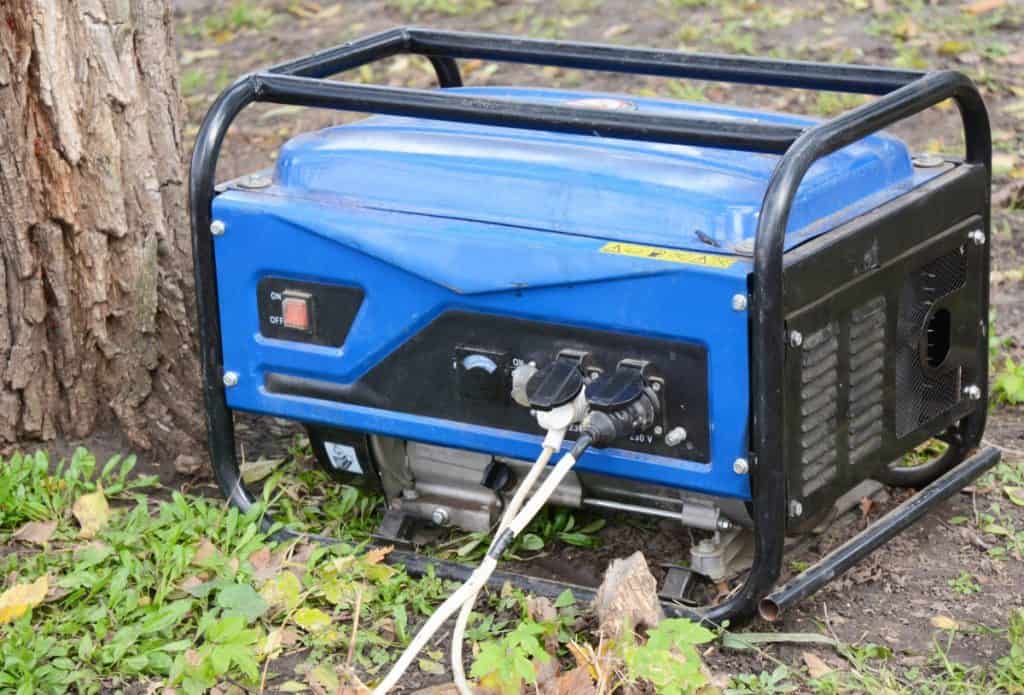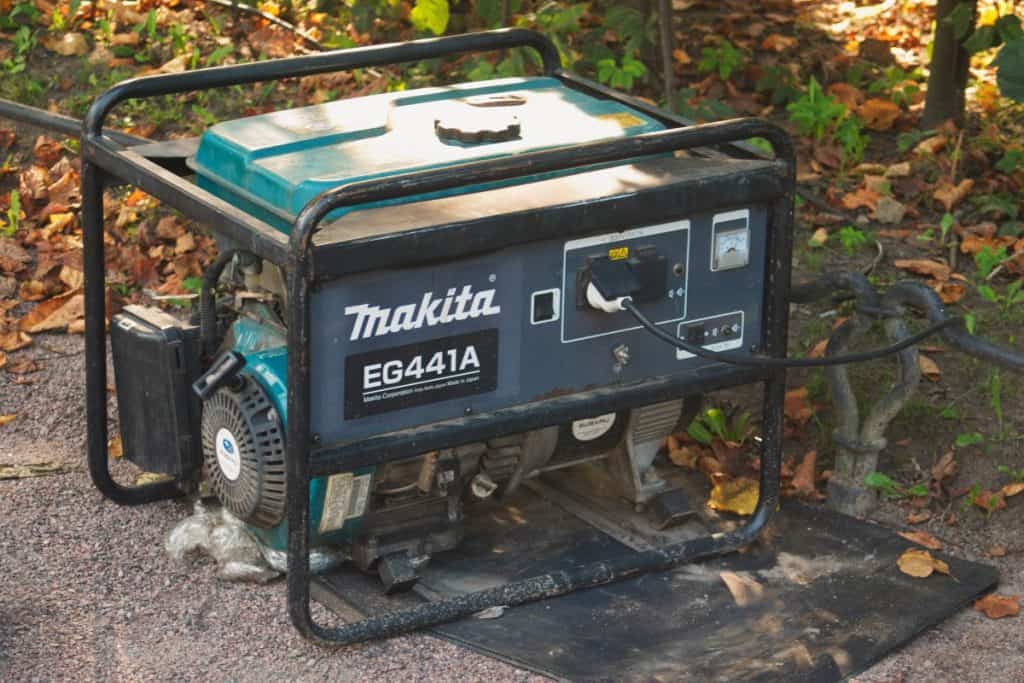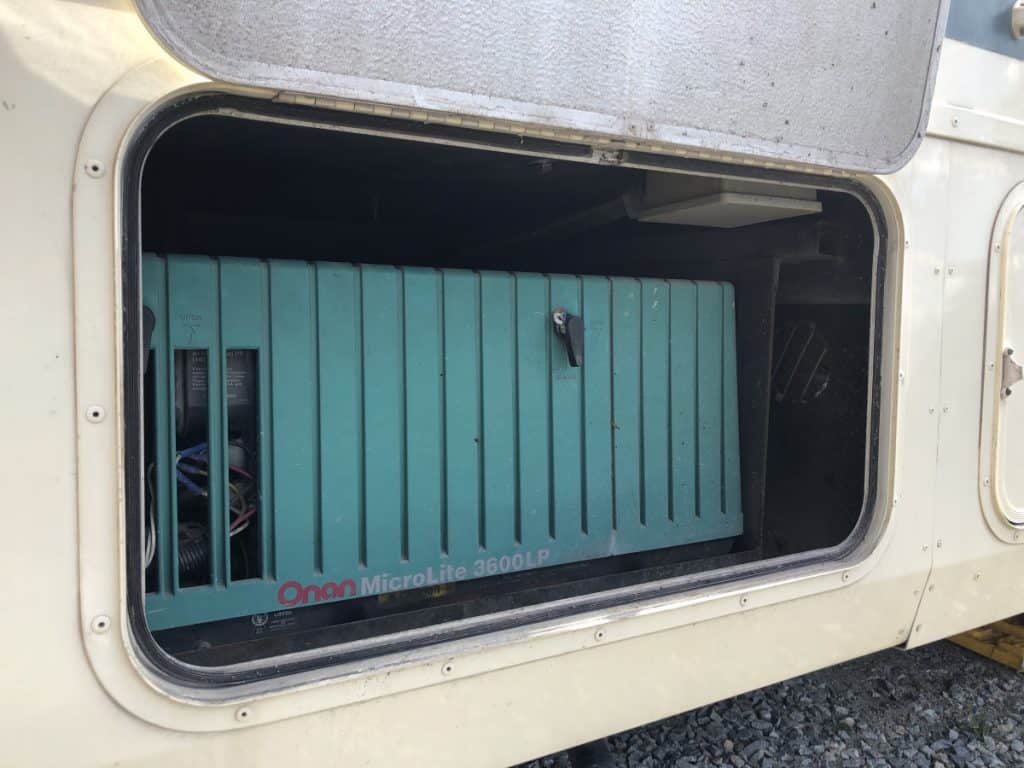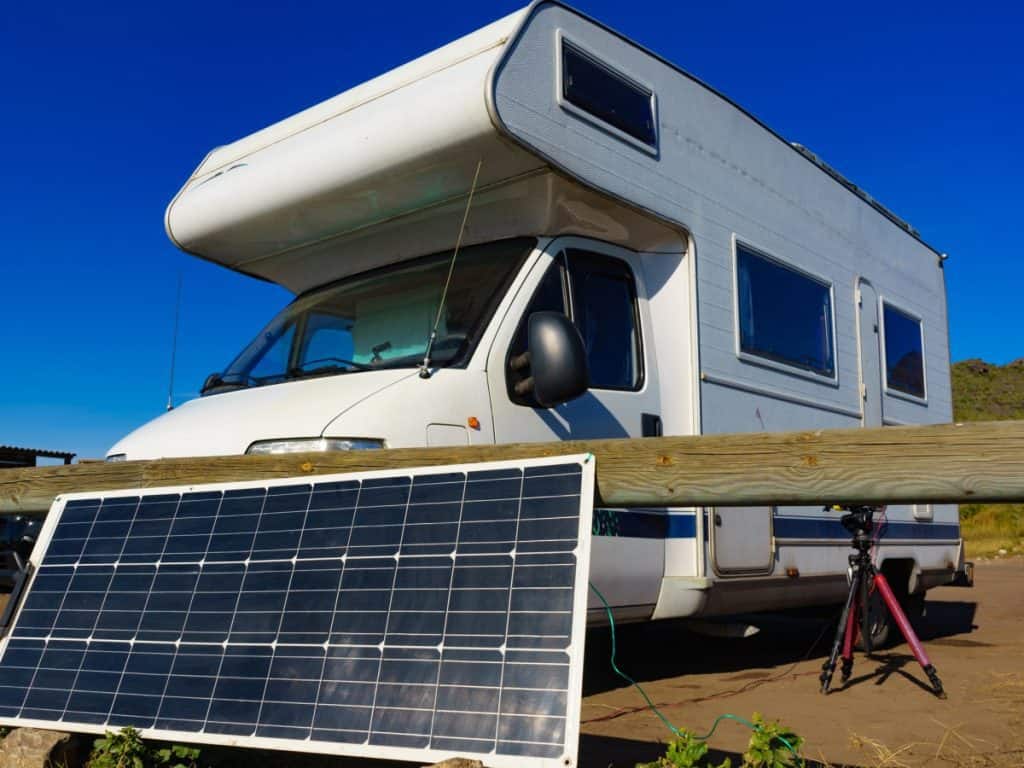This post contains affiliate links.
There are many different times that it’s helpful to have an RV generator, but you’re probably wondering exactly how long can you run an RV generator, and what things you can do to save your fuel.
The exact run time for your generator will depend on its wattage, what you hope to power, and how large of a fuel tank it has. Having said that, you can expect to get about 10-13 hours nonstop from a portable generator and at least that many from a built-in one.
Whether you’re boondocking or visiting a state park, there are many times when you won’t necessarily have access to shore power and a generator will be your best friend. By knowing how long you can expect your generator to run you’ll be able to plan accordingly and make the most out of your camping trip.

Table of Contents
Portable Generator Run Time
One of the biggest factors that will determine how long you can run your portable generator without having to stop is how many gallons of gasoline it can hold. Portable generators can hold anywhere from 1 to 10 gallons of fuel depending on the size.
Some portable generators are able to run off of liquid propane as well as gas, but even though liquid propane burns more efficiently than gas it does not provide as much power per gallon used.
- Plenty of Power – With 4,850 starting watts and 3,850 running watts, this unit can handle heavy loads, from lights and a refrigerator to a...
- Dual Fuel Technology – This generator runs on gasoline or propane, giving you the freedom and flexibility of fuel choice
- Powerful Engine – The DuroMax 210cc OHV engine is a workhorse that provides plenty of power to handle multiple jobs, from powering high...
Propane generators produce 10-15% less power than their gas counterparts. You also have to have the generator hooked up to a propane tank and your run time is limited by the number of pounds your tank holds.
Similarly, the amount of gas your generator holds will determine its run time, and your generator’s wattage will determine how quickly it uses that fuel. Portable generators can run anywhere from 3,000 to 15,000 watts, and the size of the generator you need in terms of watts will depend on the size of your RV and what you are hoping to run.
A big rig like a large fifth wheel or pull-behind will need a larger generator than an A-frame, but if you only need to power some lights and your refrigerator you won’t need nearly the wattage that you’d use for your AC unit as well.
Some appliances like your water heater and refrigerator may be able to run on propane, so you wouldn’t necessarily need to use your generator for those depending on your setup.
So, your run time will depend on the amount and type of fuel your generator holds, how fast that fuel is used (the wattage), and your wattage requirements will depend on your RV’s setup. When you take everything above into consideration, your portable generator will be able to run anywhere from 8 to 24 hours nonstop.
To be a little more specific since that’s a pretty broad range, your average gas-powered generator will be able to run for 10-13 hours without stopping to refuel. You may be wondering why you can’t just put more gas in the generator while it’s running to avoid having to power down.
The answer: it’s a fire risk. Liquid gasoline does not ignite – theoretically you could drop a match into a pool of gas and nothing would happen (please don’t try that at home). What does ignite are the fumes. Generators get hot while they are running, and the hotter your engine is the more likely you are to ignite the fumes hanging around.
Plus, gas can expand and may overflow onto your hot engine as you’re filling it. All in all you should turn your generator off and let it cool down before you attempt to refuel it, and you should never let your generator run completely out of gas – this can damage both the generator and the appliances you are powering.
Something to keep in mind with portable generators is storage and security. In my article, I’ve covered some of the best ways to Secure Your RV Generator for Travel and Security.

Built-in Generators Run Time
A built-in generator operates just like a portable one: fuel goes in, gets converted to mechanical energy in the engine via combustion, then that mechanical energy is turned into electricity by the alternator.
Where a built-in generator is different, however, is that most have a fuel tank instead of gas being added directly to the generator. Fuel lines from the generator will hook up to either a tank that has been installed on the RV, a portable fuel cell that can be disconnected, or if you’re driving a motorhome then it may be connected right to the main fuel tank.
For the generators that can also hook up to liquid propane, you are limited by your propane tank capacity. A propane generator that is powering your AC as well as your other appliances will use a little less than one gallon of propane per hour.
So, since a 30 pound tank holds 7 gallons of propane you can expect a built-in generator to run for 7-8 hours before you have to switch the propane tank (for that size). For motorhomes with larger, permanent propane tanks, you can run for much longer.
For gas-powered generators, your fuel tank size is likewise the main determinant of your run time. Tanks can run anywhere from a little 6 gallon bladder to an over 60 gallon tank that installs in your truck bed. You can also expect to use about a gallon of gas per hour if you are powering your AC as well as your other appliances.
Wattage will factor into how long your built-in generator will run just like a portable one, but built-in generators tend to come in a much smaller range of wattages – between 2,000 and 6,000 generally.
Just like with portable generators it is not advised to swap out the propane tank or refill the fuel tank while the generator is running, so if you take a 4,000 watt generator and run everything you can on it, you’re likely to get about an hour per gallon of run time no matter what fuel source you use.
One other thing to consider is that many campgrounds will have limitations on how long and how often you can run your generator. The ultimate limit on your run time may end up having nothing to do with your generator’s specs and more to do with where you’re staying.

Life Expectancy of Generators
Most portable generators have a total life expectancy of 10,000 to 25,000 hours depending on their frequency of use and how well you maintain them. You should regularly change the oil, air and fuel filters, and spark plugs as part of normal maintenance, and you should also store your portable generator on an empty tank to make sure you don’t have any gas going bad.
Built-in generators have a similar lifespan – between 15,000 and 20,000 hours – and you can extend that life expectancy by doing all of your normal maintenance (including checking fuel lines!) as well as running your generator for a few hours every month.
As for the run-time expectancy, portable generators will be able to run anywhere from 8-24 hours without stopping and your built-in generator can run from hours to days depending on your fuel source and amount.
Generator Fuel Saving Tips
Extending the run time of you generator can be done by doing a few simple power saving things. If your generator uses less fuel then your will get to run your generator for longer before you need to fill up. Here are a few simple tips I’ve found
Close Windows and Doors while Using the A/C
One of the biggest things you can do to reduce your fuel use is to make sure you aren’t making your generator work harder than it needs to. You would be surprised how many people run their AC on their generator, but have the front door hanging open.
By making sure you’re keeping your windows and doors closed as much as possible while running your AC, you’ll cut down on the run time and the amount of fuel you use to get down to temperature.
Install LED Lights
Another thing you can do is to change your lights over to LED if they aren’t already. LED lights use significantly less energy than incandescent bulbs and will decrease the wattage required to power your lights.
Learn how we upgraded our RV lights to LEDs in our article, How To Change RV Lights To LEDs.
Maintain Your Generator
Doing periodic maintenance on your generator will also make sure it’s running as efficiently as possible, and you can lower your overall fuel consumption just by changing your filters, plugs, etc.
Reduce the Load on the Generator
Another way to save generator fuel is to reduce the load on your generator. By this, I mean only run the appliances on electricity that really have to be. In many RVs, your refrigerator and water heater can be run on propane, and while you’re trading one fuel source for another there will be less of a draw on your generator specifically.
Add Solar to Assist with Power Load
One thing that is becoming more and more popular for RVs is to install solar panels. Solar is awesome because you can charge your battery and run battery-powered fixtures without having to spend any fuel, and you can also use that electricity to cut down on the wattage you have to draw from your generator.

Closing Thoughts
In summary, how long can an RV generator run is dependent on many factors from the wattage to the size of the fuel tank. Running at full capacity you can expect both your portable and built-in generator to use around a gallon of fuel per hour, and you can help extend the life of your fuel by lowering the draw on your generator.




